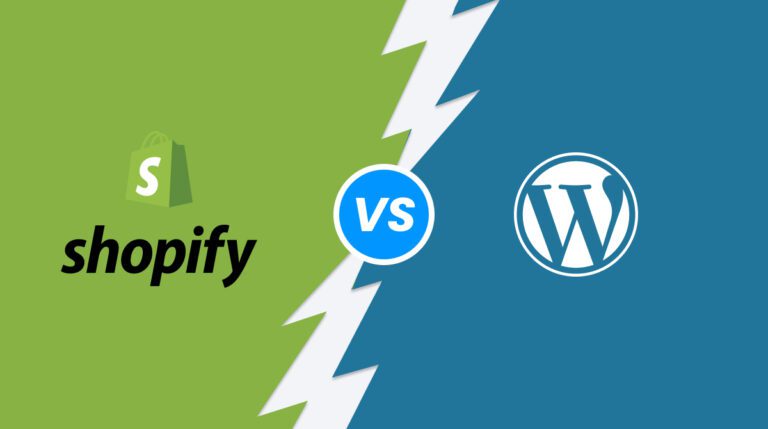In the current digital landscape, having a strong online presence is crucial for businesses of all sizes. Whether you’re launching a new venture or looking to revamp your existing online storefront, one of the most important decisions you’ll face is choosing the right platform to build your website. Two popular options that often come head-to-head are Shopify and WordPress. Both platforms have their strengths and weaknesses, and the choice between them can significantly impact your website development journey and long-term success.
As a leading website development company, Namastetu India understands the importance of making an informed decision when it comes to selecting the right platform for your business. In this comprehensive guide, we’ll explore the key factors to consider when choosing between Shopify and WordPress, helping you make the best choice for your unique needs.
Understanding Shopify and WordPress
Before diving into the comparison, let’s briefly introduce both platforms:
Shopify: Shopify is a dedicated e-commerce platform that provides an all-in-one solution for businesses looking to build ecommerce websites. It offers a user-friendly interface, built-in payment processing, and a wide range of customizable themes and apps.
WordPress: WordPress is a versatile content management system (CMS) that powers over 40% of all websites on the internet. While it started as a blogging platform, WordPress has evolved into a robust solution for creating various types of websites, including e-commerce stores with the help of plugins like WooCommerce.
Now, let’s delve into the key factors to consider when choosing between Shopify and WordPress:
Ease of Use and Learning Curve
Shopify:
- User-friendly interface designed specifically for e-commerce
- Drag-and-drop editor for easy customization
- Managed hosting, so you don’t need to worry about technical aspects
WordPress:
- Steeper learning curve, especially for beginners
- More flexibility and control over your website’s structure
- Requires more technical knowledge or assistance from a wordpress website designer
For businesses without technical expertise, Shopify’s intuitive interface may be more appealing. However, if you’re willing to invest time in learning or have access to a skilled website development team, WordPress offers greater customization potential.
E-commerce Capabilities
Shopify:
- Built specifically for e-commerce
- Robust inventory management system
- Integrated payment processing and shipping options
- Extensive e-commerce features out of the box
WordPress:
- Requires additional plugins like WooCommerce for e-commerce functionality
- More flexibility in terms of customizing the shopping experience
- Wide range of payment gateways and shipping integrations available
If your primary focus is selling products online, Shopify’s dedicated e-commerce features may give it an edge. However, WordPress with WooCommerce can offer comparable functionality with more room for customization.
Design and Customization
Shopify:
- Limited free themes, but a wide range of premium themes available
- Themes optimized for e-commerce and mobile responsiveness
- Restricted ability to modify underlying code
WordPress:
- Vast selection of free and premium themes
- Unlimited customization possibilities
- Full access to modify code and create custom designs
For businesses seeking a unique look and feel, WordPress offers more flexibility in terms of design and customization. However, Shopify’s themes are specifically optimized for e-commerce, which can be advantageous for online stores.
Scalability and Performance
Shopify:
- Built to handle high traffic and sales volumes
- Automatic updates and security patches
- Content Delivery Network (CDN) included
WordPress:
- Scalability depends on hosting and optimization
- Requires regular updates and maintenance
- Performance can be enhanced with caching plugins and CDNs
Shopify’s managed platform ensures consistent performance as your business grows. WordPress, while scalable, may require more attention to optimization and web performance optimization techniques.
SEO and Marketing Features
Shopify:
- Basic SEO features built-in
- Integration with various marketing tools
- App store offers additional marketing functionalities
WordPress:
- Powerful SEO plugins like Yoast SEO available
- Greater control over on-page SEO elements
- Extensive marketing plugins and integrations
Both platforms offer strong SEO best practices capabilities, but WordPress provides more granular control over SEO elements, which can be advantageous for businesses focusing on organic search traffic.
Costs and Pricing Structure
Shopify:
- Monthly subscription plans with different feature sets
- Transaction fees (unless using Shopify Payments)
- Additional costs for premium themes and apps
WordPress:
- Free to use, but costs associated with hosting, domain, and premium themes/plugins
- No transaction fees, but payment gateway fees apply
- Potential for higher website development costs due to customization
While Shopify’s pricing is more straightforward, the cost to build a website with WordPress can vary greatly depending on your specific needs and the level of customization required.
Technical Considerations
Shopify:
- Managed hosting and security
- Limited access to server-side code
- Automatic backups and updates
WordPress:
- Requires separate hosting and security measures
- Full access to server-side code
- Manual or plugin-based backups and updates
For businesses without dedicated IT resources, Shopify’s managed platform can be advantageous. However, if you have a back end developer or front end developer on your team, WordPress offers more technical flexibility.
Integrations and Extensibility
Shopify:
- App store with numerous e-commerce-focused integrations
- Limited ability to add custom functionality
WordPress:
- Vast ecosystem of plugins for various functionalities
- Ability to create custom plugins and integrations
WordPress’s extensive plugin ecosystem and API integration capabilities make it more versatile for businesses with unique requirements or those looking to implement custom web development solutions.
Content Management and Blogging
Shopify:
- Basic blogging functionality
- Limited content management features
WordPress:
- Powerful content management system
- Extensive blogging capabilities with various customization options
For businesses that rely heavily on content marketing or require complex content structures, WordPress’s robust CMS capabilities give it a significant advantage.
Mobile Responsiveness and App Development
Shopify:
- Themes optimized for mobile-first design
- Native mobile app for store management
WordPress:
- Responsive themes available
- Requires additional plugins or development for mobile app functionality
Both platforms offer responsive web design capabilities, but Shopify’s native mobile app for store management can be a valuable tool for busy e-commerce entrepreneurs.
Making the Right Choice for Your Business
Choosing between Shopify and WordPress ultimately depends on your specific business needs, technical expertise, and long-term goals. Here are some scenarios where each platform might be the better choice:
Choose Shopify if:
- You’re primarily focused on e-commerce and want an all-in-one solution
- You have limited technical expertise and prefer a managed platform
- You need a quick and easy way to start selling products online
- You don’t require extensive customization or unique functionality
Choose WordPress if:
- You need a versatile platform for both e-commerce and content management
- You want full control over your website’s design and functionality
- You have access to technical resources or are willing to learn
- You require complex integrations or custom features
- You plan to scale your website with unique functionalities over time
Regardless of your choice, it’s essential to consider factors such as user experience design, JavaScript frameworks, server-side development, full-stack development, database management, and web security practices to ensure your website meets modern standards and performs optimally.
Conclusion:
Partnering with Namastetu India for Your Website Development Needs
Whether you choose Shopify or WordPress, having a professional website development company by your side can make all the difference in creating a successful online presence. At Namastetu India, our team of skilled website developers specializes in both Shopify and WordPress platforms, ensuring that you get the best solution tailored to your unique business needs.
From concept to launch, we handle every aspect of your website development, including front-end technologies, UX/UI design principles, cross-browser compatibility, and digital marketing integration. Our expertise in web application development and e-commerce solutions allows us to create high-performing, scalable websites that drive results for your business.
Don’t let the complexities of website design services hold you back. Contact Namastetu India today, and let our experienced team guide you through the process of building your dream website, whether on Shopify, WordPress, or any other platform that best suits your needs. Together, we’ll create a powerful online presence that helps your business thrive in the digital landscape.
FAQs About Should I Build My Website on Shopify or WordPress?
How long does it typically take to build a website on Shopify vs. WordPress?
The time to build a website varies depending on complexity, but generally, Shopify sites can be set up faster (1-2 weeks) compared to custom WordPress sites (2-8 weeks).
Can I switch from Shopify to WordPress or vice versa after building my website?
Yes, it’s possible to migrate between platforms, but it can be a complex process. Namastetu India can assist with seamless platform migrations.
Which platform is better for SEO, Shopify or WordPress?
Both platforms can be optimized for SEO, but WordPress offers more granular control and powerful SEO plugins, giving it a slight edge for advanced optimization.
Do I need coding skills to use Shopify or WordPress?
Basic websites can be built on both platforms without coding skills. However, for more advanced customization, some coding knowledge or professional assistance is beneficial.
How do Shopify and WordPress handle website security?
Shopify manages security for you, while WordPress requires you to implement security measures. Both can be secure when properly maintained.




